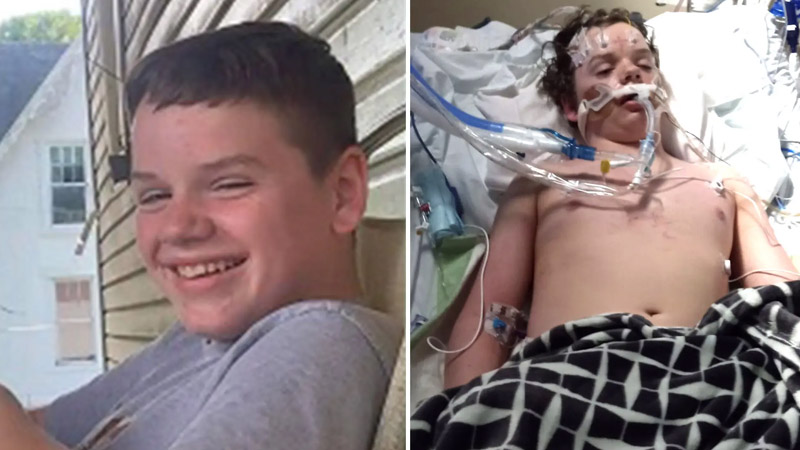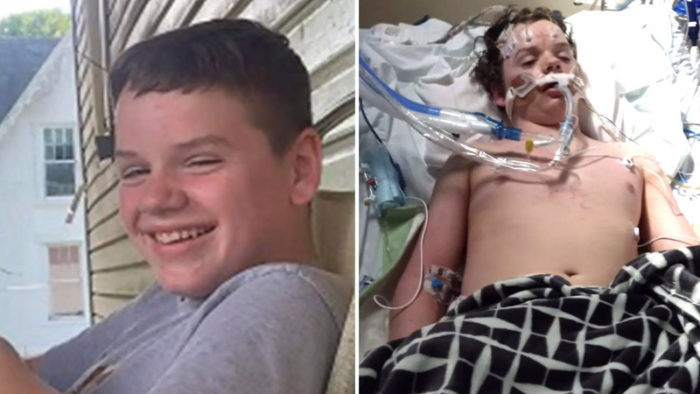Teenagers who attempted the potentially lethal action uploaded it to TikTok in 2020 in an effort to achieve social media clout. Jacob’s father, Justin, told ABC 6 that the weekend before last, his son overdosed while visiting with friends at home.
The Columbus guy was caught on camera swallowing the drugs, which was followed, according to reports, by his body beginning to stiffen up. The teen’s heartbroken father lamented, “That was too much for his body.” After that, Jacob was taken to the hospital and put on a ventilator.
The boy died six days later, on what his father called the “worst day of his life,” despite the greatest efforts of the medical staff. When Justin learned that his son wouldn’t wake up, it was heartbreaking.
The grieving father stated, “No brain scan, there was nothing there.” Nevertheless, he won’t ever open his eyes, breathe, smile, walk, or talk. Doctors told us we could keep him on the vent.
Dianna Stevens, the boy’s grandmother, struggled through tears as she pledged to do everything in her power to prevent a similar situation from happening to any other children in the future. In the meantime, Jacob’s family recalls him as a polite, humorous, and loving child.
No matter how miserable my day had been, Jacob was always able to make me grin, Justin recounted with emotion. The grieving Ohioan is also advising parents about the risks of allowing kids to use social media unattended in light of his son’s untimely demise.
Watch what they are doing on that phone, he said. “Discuss the situation with them. I want everybody to be aware of my son. Meanwhile, Justin is pleading with lawmakers to impose age limitations on over-the-counter medications like Benadryl; he calls this effort his “life ambition.”
He wants TikTok to implement comparable security measures, such as requesting IDs from users prior to account creation. Regrettably, Jacob isn’t the Benadryl Challenge’s first casualty. An additional unsuccessful attempt at the stunt involved a 15-year-old girl who overdosed fatally on an allergy medication in August 2020, according to the NY Post.
Johnson & Johnson, the challenge’s manufacturer, warned the public about the challenge after a slew of fatalities, saying: “The Benadryl TikTok fad is exceedingly alarming, deadly, and should be stopped immediately.” A PSA was also released by the Food and Drug Administration.
The ubiquitous over-the-counter (OTC) allergy medication diphenhydramine (Benadryl) can cause major heart issues, seizures, comas, or even death, according to the FDA. We are aware of news reports about teens who took the “Benadryl Challenge,” which was promoted in videos uploaded to the social media platform TikTok, and ended up in emergency rooms or died as a result.
Health care practitioners should inform teenagers’ caregivers about the “Benadryl Challenge,” they continued. Time may be running out for the teens of TikTok, tick tock. The massive viral video platform made significant modifications for users under the age of 18 in March, and a one-hour daily screen time limit is scheduled to go into effect in the coming weeks in an effort to stop youths from becoming “boring beasts” due to ceaseless scrolling.
The intention is to limit how teenagers use the increasingly well-liked and contentious software. In an effort to stop China’s communist government from spying on American people, the White House ordered government agencies to remove the TikTok app from their devices within 30 days. The new limitations were announced two days later.
According to Cormac Keenan, head of trust and safety at TikTok, “we think that digital experiences should provide joy and play a constructive part in how people express themselves, find ideas, and interact.”
“We’re expanding Family Pairing with additional parental restrictions, offering new default settings for teen accounts, and upgrading our screen time tool with more personalized options.” Every user under the age of 18 will immediately be subject to the new 60-minute time limit, and after an hour, they will be prompted to input a passcode in order to continue scrolling.
Users under the age of 13 will also have a 60-minute time limit, but they will be allowed an additional 30 minutes if a parent or guardian sets a passcode or enters one that is already in place.


